It’s hard to have missed the memo on the detrimental impact that human behavior is having on the planet. Our planet. My kids came home from their half-day of school on the Friday before Christmas and donned not their snow gear (as one might expect where we live), but shorts and T-shirts! It’s no wonder that so many people are becoming more interested in eco-friendly homes.
What about you? Is this something you’ve considered? It’s one thing to say “I want to lessen my family’s footprint on the earth” – but what are you actively doing about it? If this is something you’ve considered, or want to explore more in the new year, this post will give you some places to start.
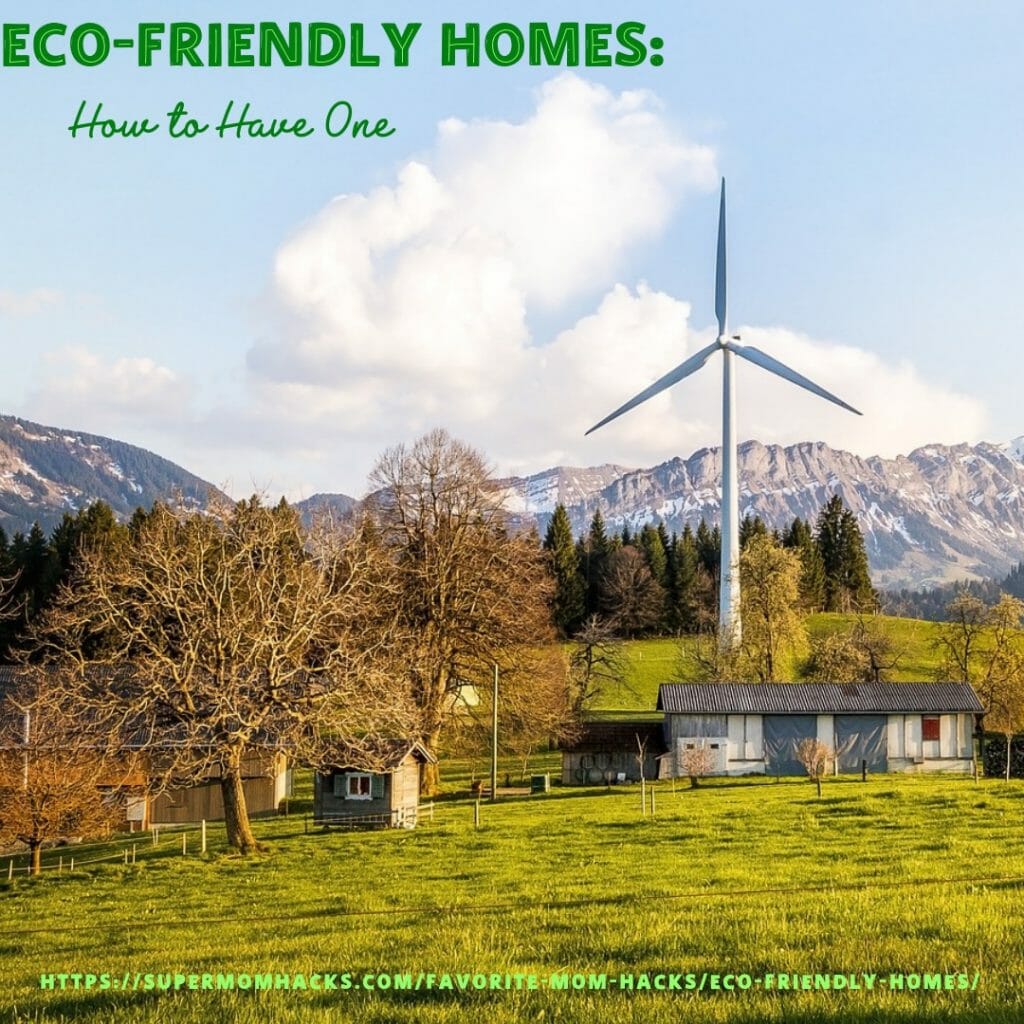
Ways To Have More Eco-Friendly Homes
Eco-Friendly Design
Looking to buy a new home? Thinking about renovating your current home, and interested in what sets eco-friendly homes apart? There are plenty of companies out there that specialize in “green building”; this is where you want to start. These professionals can help you evaluate how to build a home that’s green from the ground up. They also can help you retrofit existing construction to be more eco-friendly.
We have neighbors and friends who’ve installed everything from solar panels to geothermal heating/cooling systems. This past spring, after putting it off for too many years, we even installed our own solar panels. While cost varies widely depending on what you’re considering, there are lots of opportunities to consider modifications or green building at all sorts of price points.
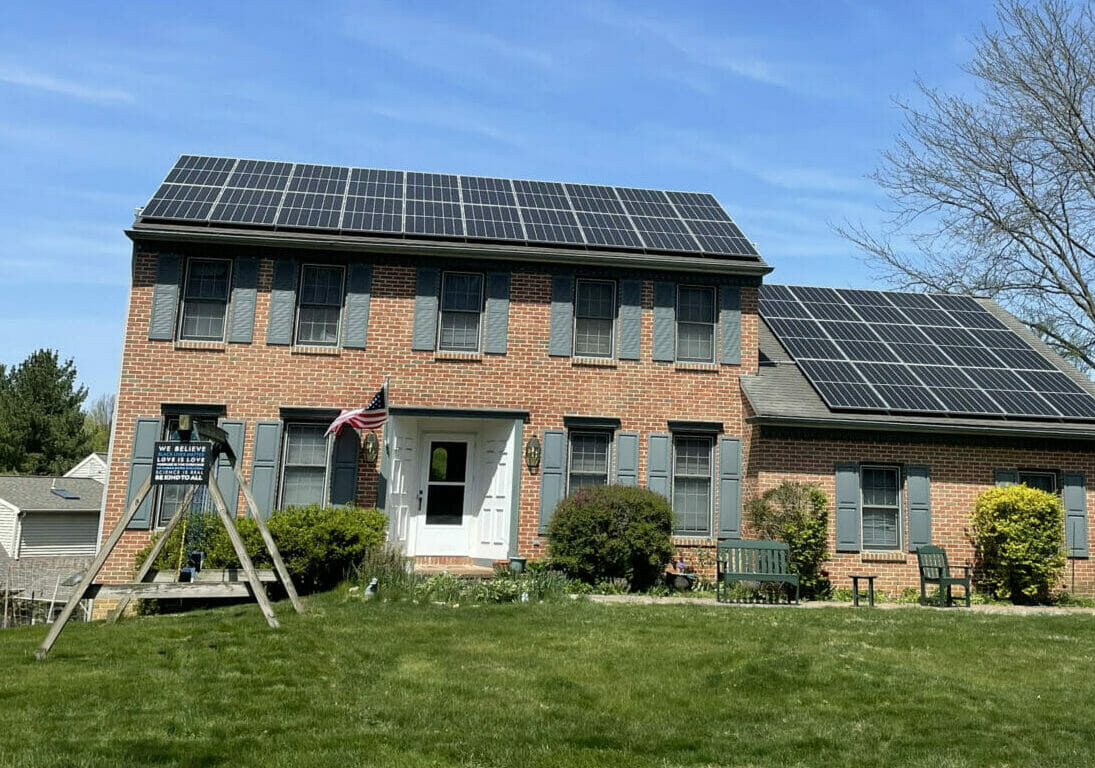
Check with your locality and state, as well as the federal government, to see which (if any) rebates or tax incentives you might qualify for. These can help make the cost of any larger modifications less prohibitive. And before considering any “green” building options, it’s also a good idea to figure out how many years of savings it will take you to recoup your costs. If you’re torn between two different eco-friendly power options, for example, this could help you decide which is right for you.
And of course, perform your due diligence before buying (or building) a home. Is your home in a floodplain? Do surrounding woods plus historic precipitation trends put your home in danger of being hit by wildfires? How will building a new home affect existing wildlife and plant life? Eco-friendly homes coexist peacefully with their surroundings, rather than trying to build in places that are less well-suited to human dwellings.
Eco-Friendly Energy
One of the biggest challenges for eco-friendly homes is energy consumption. Many people sign up with the first energy provider they come across, or choose their electricity provider based solely on cost. The problem for eco-friendly homes is that the least expensive fuel sources often rely on fossil fuels.
Those who want truly eco-friendly homes take the time to do some research. Depending on where you live, your state or region may have an online comparison tool. You can use these tools to find greener alternatives to fossil-fuel-based electricity providers. Consider choosing a power provider that generates its electricity from sustainable, renewable resources. Even if it costs a little more, it will be worth it.
Or you could start generating some of your own energy through solar panels or wind generators. You may want to have some sort of backup supply, just in case. But adding solar panels or a wind turbine can really make a difference, both in your home’s eco-friendliness and in your electrical bills. Now that we’ve gone solar, my husband LOVES watching our app to see how much power our panels are generating every day, knowing that we’re feeding way more solar energy back into the electrical grid than we’re consuming.
Finally, don’t overlook the basics. Make sure you keep your heating/cooling system serviced so it runs efficiently. See if your electrical provider offers a free or low-cost energy audit, which may help you identify ways to conserve energy. And make sure you train other family members to turn off lights, unplug energy-draining appliances, etc. when not in use.
Eco-Friendly Cleaning Products
What about the cleaning products you use in and around your home? So many of them are loaded with chemicals that aren’t very good for humans OR the environment.
When you’re shopping at the store, look to see if there are more eco-friendly alternatives to the cleaners you regularly use. Do some research to see what effective green alternatives exist. Or maybe you want to look into your own homemade “green” cleaning alternatives, such as vinegar and baking soda cleaning hacks.
RELATED POST: Green Home Hacks to Save Money and Save Mother Earth
As just one example: I know a mama who makes her own laundry soap. You may think this sounds crazy, but she swears by her recipe. And get this: the supplies she purchased to mix up new laundry soap each month will save her over $400 before she uses them all, in about three years!
Eco-Friendly Habits
Finally, especially as the new year approaches, it’s worth thinking about what lifestyle changes you and your family might consider in the coming year. There are so many things you can do here, to help your lives and your home turn over a “green” leaf:
- Switch from paper napkins to cloth ones.
- Look into purchasing items in bulk to save on packaging waste. Or if you regularly buy in bulk but don’t use items before they expire or go bad, maybe you should reconsider that part of your shopping.
- Rethink your entire output of trash waste in your family, and vow to reduce the amount of trash your family produces. This could be through smarter buying choices, by composting leftovers and food scraps, or through rethinking your entire purchasing stream.
- Plant a garden to grow some of your own food.
RELATED POST: Why Your Kids Will Love A Tasting Garden
RELATED POST: How To Start A Garden At Home
- Rethink what else comes into your house besides packaging waste. Resolve to do better at the old Depression-era adage “use it up, wear it out, make it do, or do without.” Before you buy a brand-new piece of furniture, appliance, or article of clothing, consider if there are secondhand alternatives that are just as good.
RELATED POST: 10 Reasons Children’s Resale Events Rock
- You could even try a no-spend experiment. I’ve tried to do “No November” for several years, and my blogging friend Sarah Brumley recently completed a No-Spend October challenge. (See her chronicle of this journey at her blog Sarah Brumley Blog.) “No-spend” or “limited-spend” months are great for cutting your consumption and lining your wallet.
RELATED POST: Do You Need “NO November”?
These are just a few steps that you can take to make your home as eco-friendly as possible! With each little baby step you make, you’re well on your way toward a sustainable lifestyle. And if everyone worked together toward more eco-friendly homes, just imagine the impact we could have!
If you enjoyed this post on having more eco-friendly homes, why not share it with others by pinning this image?
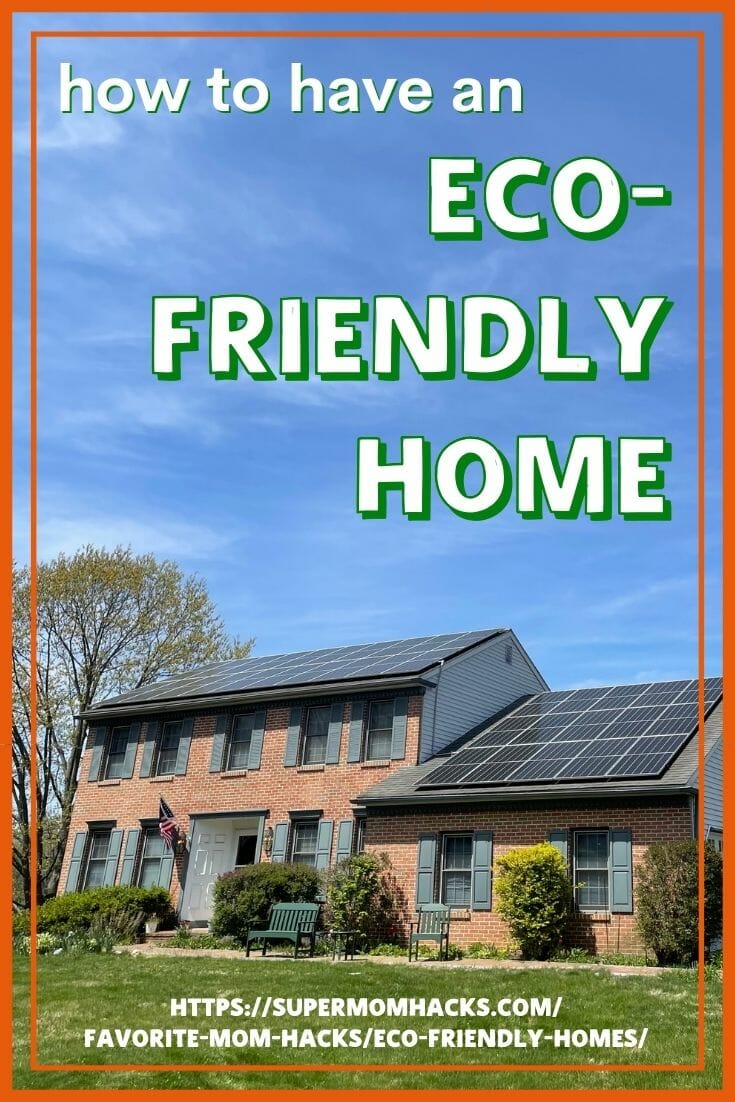
NOTE: This site contains affiliate links. I may earn a small commission from any purchases made through affiliate links, at no additional cost to you. For more information, please read the full disclosure/privacy policy.
Follow Super Mom Hacks on Facebook, Instagram, Pinterest, and Twitter!
Or stay in the loop by ✅ joining our mailing list!
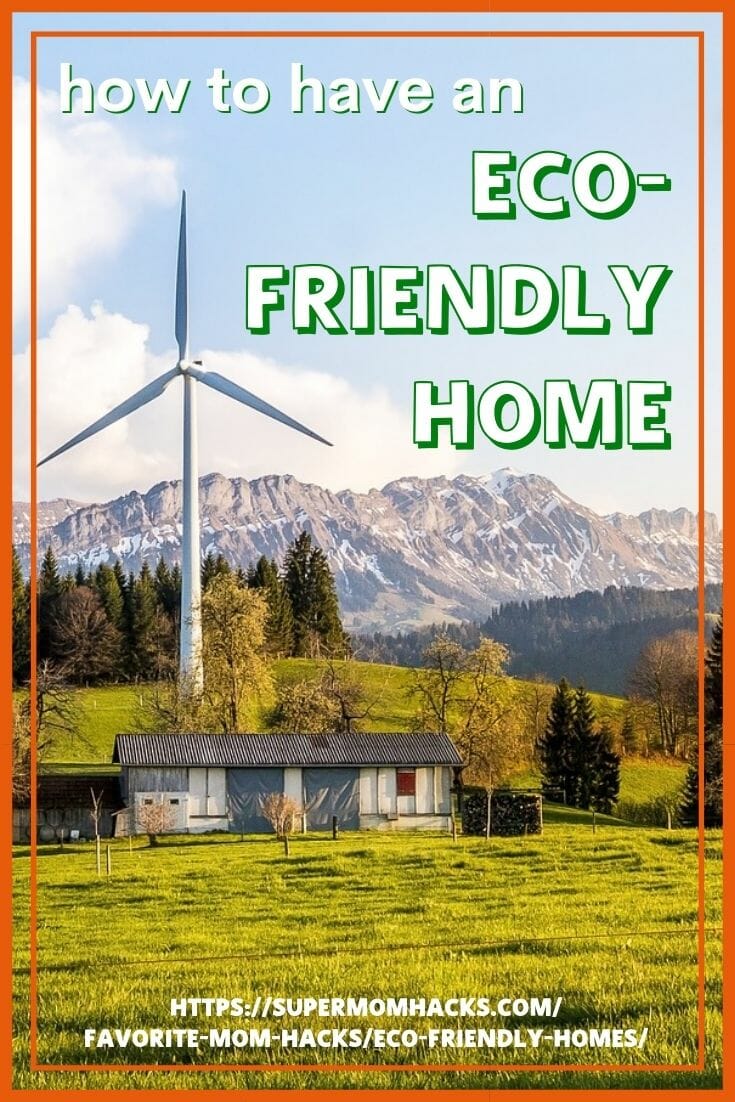


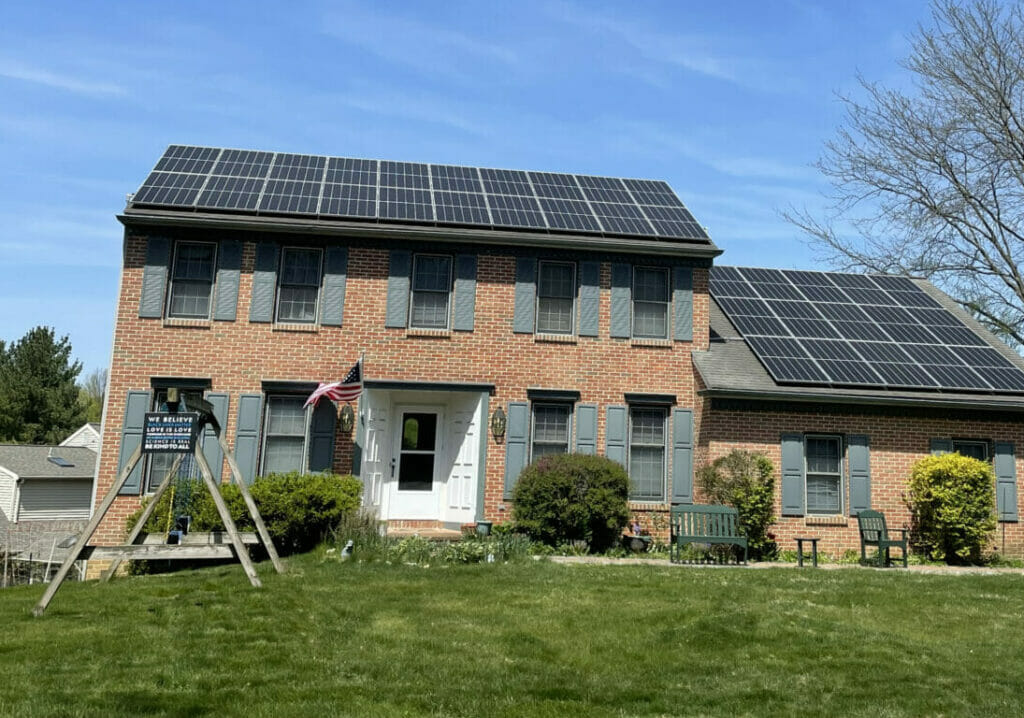
I try to be as eco-friendly as possible when I’m home by recycling and using eco-friendly cleaning products. These are great tips!
So glad you liked them! Every little bit helps!
When I was living/working in California,I saw those windmills everywhere. I don’t see them on the East Coast even though I know we are eco-friendly and try to honor the tips you suggested. It would great to go full swing at it.
I have seen them in scattered places on the East Coast, but you’re right, they aren’t as prevalent…
When I have my own house, I will look for one that surround with trees because it always been my dreams for have one like it.
As long as the trees aren’t TOO close! I think at least 150 ft is what is recommended to reduce your risk from wildfires. (I should know this, as my brother fights them for a living, but the exact number is escaping me right now…)
I can definitely start out with eco friendly products! My cleaning products have been eco friendly and I use reusable bags when grocery shopping! I need to try other ways to continue to be eco friendly.
Every little bit helps, and they all add up to make a difference! 🙂
Very very cool. I think it’s so important to do as much as you can to help protect the environment.
When it comes time for us to buy a house I know that we will be looking for an eco friendly build or something that needs updating and we can update to eco friendly anyways. It’s important to remember the environment and I know I am not doing enough.
I think we ALL can do more, little by little. As long as we make it a priority!
You know me, I love love love this post! My family is actively trying to reduce our plastic and waste in our home. While the home we are in is not built eco-friendly, our next home will (hopefully) be custom designed with eco-friendly in mind! We already use reusable as much as possible. I even heard my 5 year old explaining to my MIL the other day why we don’t have paper plates or paper towels in our house since they are wasteful!
That is SO great that your 5yo can articulate that! I would just love to get my husband on board with cloth napkins. My in-laws go through paper towels, paper napkins, and paper plates like nobody’s business, and he is still of a mindset that this is easier (though I’ve made sure we have enough plates to avoid using paper ones regularly, as my FIL does, and I’ve also gotten him into the habit of owning enough dishtowels that we can use those regularly instead of paper towels…)